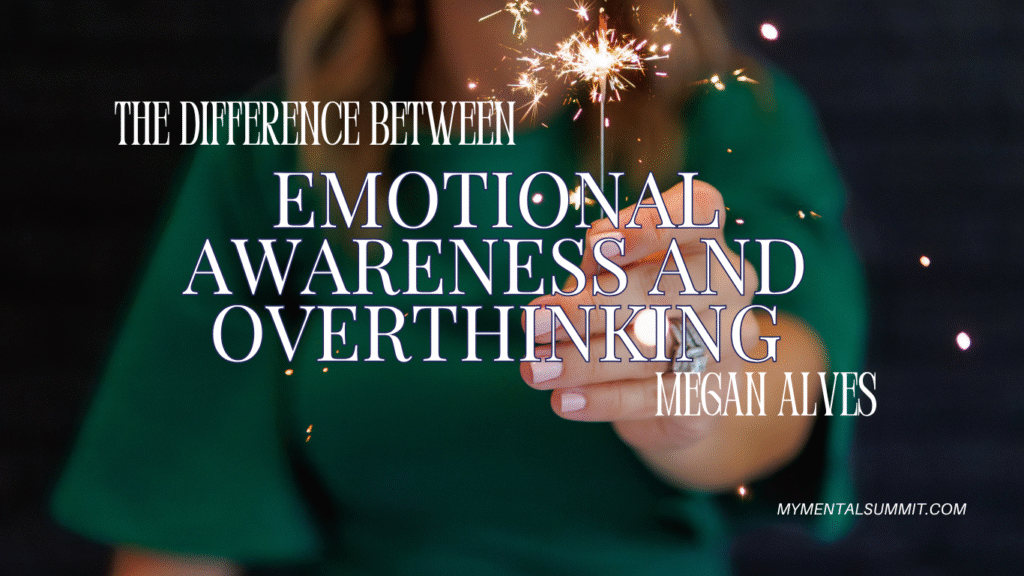Is It Emotional Awareness or Just Overthinking? Here’s How to Tell
Have you ever caught yourself thinking, “Am I being emotionally intelligent… or just spiraling?”
You’re not alone.
In today’s fast-paced world, where emotional intelligence is often praised as the key to effective leadership and personal growth, many of us confuse emotional awareness with overthinking. While they may appear similar on the surface, they lead to drastically different outcomes.

What Is Emotional Awareness?
Emotional awareness is the ability to recognize and understand your emotions as they happen. It helps you become more present, more intentional, and better equipped to manage your responses. Instead of reacting impulsively, emotionally aware individuals pause, reflect, and then choose how to respond.
It looks like this:
- “I’m feeling frustrated. What triggered this?”
- “This situation is making me anxious. What’s underneath that?”
- “I feel joy right now. I want to savor this.”
Notice how each thought acknowledges the emotion without judgment. Emotional awareness creates space for clarity.
What Is Overthinking?
Overthinking, on the other hand, traps you in a loop of mental noise. Instead of clarity, it breeds confusion. Rather than processing emotions, overthinking spins stories, worst-case scenarios, and hypothetical conversations.
It often sounds like:
- “Why did I say that? They probably think I’m unprofessional.”
- “What if I fail? What if everything falls apart?”
- “I should’ve handled that differently. I always mess up.”
Unlike emotional awareness, which centers you, overthinking pulls you further away from your present experience. It feeds anxiety and leaves you feeling drained.
The Key Differences
| Emotional Awareness | Overthinking |
| Grounded in the present | Stuck in the past or future |
| Accepts and explores feelings | Analyzes and critiques feelings |
| Creates clarity and calm | Leads to confusion and overwhelm |
| Encourages self-compassion | Fuels self-doubt and judgment |
Why This Distinction Matters
When you confuse overthinking with emotional awareness, you risk getting stuck in a cycle of stress disguised as “personal growth.” You may think you’re being mindful, but in reality, you’re exhausting your brain without resolution.
But when you practice emotional awareness, you learn to ride the wave of emotions without drowning. You become better at regulating your feelings, navigating challenges, and making clear-headed decisions—all essential traits for women navigating careers, motherhood, or entrepreneurship.
How to Shift from Overthinking to Awareness
- Name the Emotion
Start by simply naming what you feel: sad, anxious, excited, annoyed. Naming creates separation from the emotion and reduces its power over you. - Pause and Breathe
Before you spiral, pause. Take a few deep breaths. This activates the parasympathetic nervous system and brings you back to the present. - Ask, Not Judge
Replace “Why am I like this?” with “What am I learning from this?” Curiosity leads to clarity; judgment leads to shame. - Journal the Facts
Write down what happened without attaching meaning. Stick to facts, not assumptions or imagined consequences.
Seek Support When Needed
Sometimes, the difference between awareness and overthinking becomes blurry. Speaking with a coach, therapist, or attending a supportive event can bring fresh perspective.
Final Thoughts
Emotional awareness empowers you. Overthinking depletes you.
The difference lies in how you relate to your thoughts and feelings.
You don’t need to overanalyze to grow—you just need to pay attention with kindness.
💡 Want to dive deeper into emotional clarity and regulation?
👉 Download your free guide:
“Unlock Better Stress Management”
Unlock a deeper understanding of your feelings and build a personalized plan for emotional regulation to thrive in every area of life. Ready to move from overthinking to emotional empowerment? Your next step starts now. Check out mymentalsummit.com for more!
